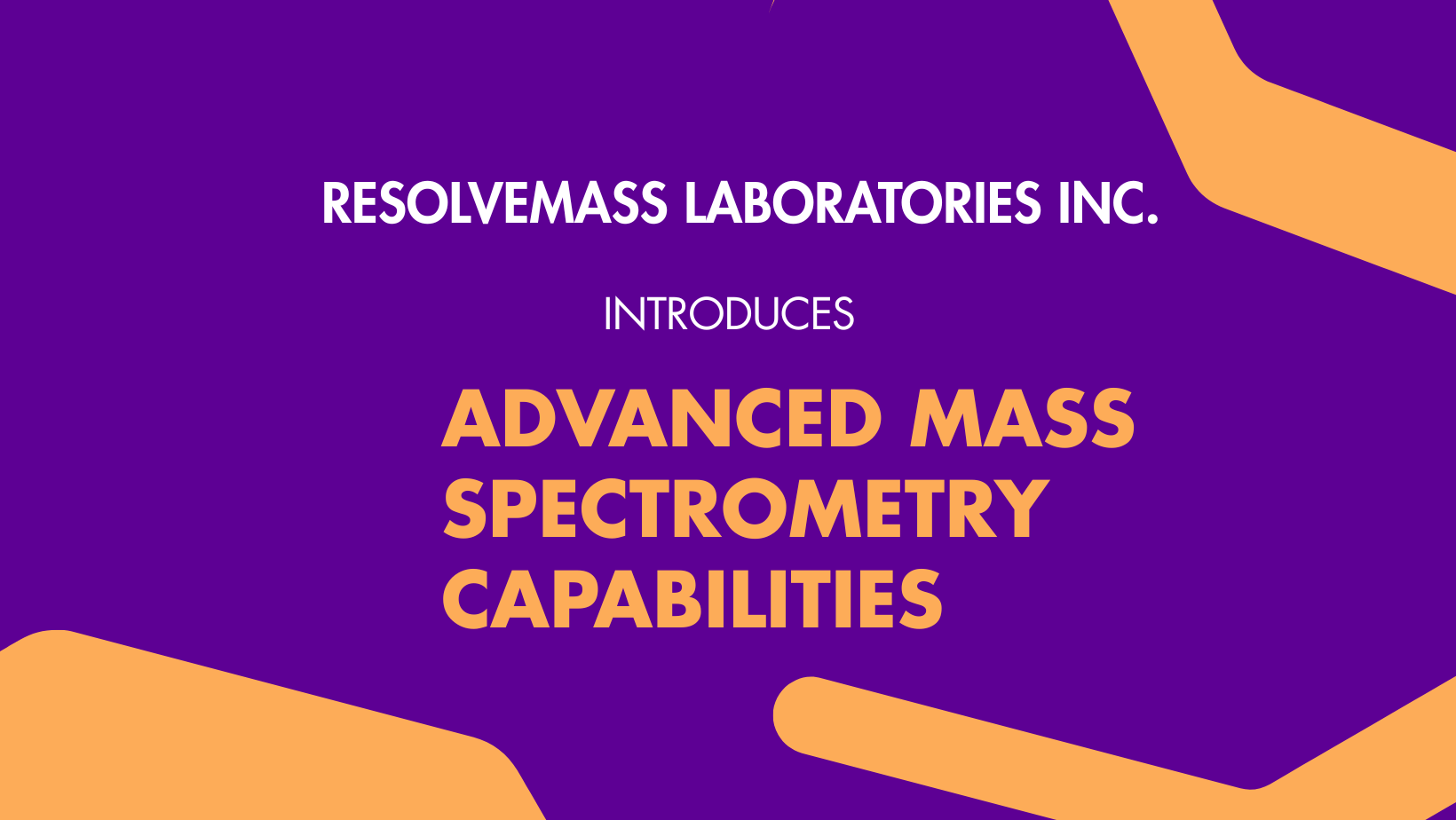Introduction
In the realm of pharmaceutical manufacturing and chemical synthesis, the identification and monitoring of in-process organic compounds are critical for ensuring product quality, process efficiency, and regulatory compliance. Liquid Chromatography-Mass Spectrometry (LC-MS) has emerged as a powerful analytical tool for this purpose, offering high sensitivity, specificity, and versatility. As a leading Contract Research Organization (CRO) specializing in custom synthesis and analytical services, Resolvemass Laboratories leverages advanced LC-MS technology to provide comprehensive identification and characterization of in-process organic compounds, aiding clients in optimizing their processes and achieving consistent, high-quality outcomes.
Understanding In-Process Organic Compound Identification
In-process organic compounds include starting materials, intermediates, by-products, and degradation products formed during chemical reactions. Accurate identification and quantification of these compounds are essential for:
- Process Optimization: Understanding reaction pathways and identifying key intermediates and by-products can help optimize reaction conditions, improve yields, and reduce waste.
- Quality Control: Ensuring that the final product meets specified quality standards by monitoring and controlling impurities and degradation products throughout the manufacturing process.
- Regulatory Compliance: Meeting regulatory requirements for impurity profiling and ensuring the safety and efficacy of pharmaceutical products.
The Role of LC-MS in Process Control
LC-MS combines the separation capabilities of liquid chromatography (LC) with the detection and identification power of mass spectrometry (MS). This synergy makes LC-MS an ideal tool for the analysis of complex mixtures, providing detailed information on the composition and structure of organic compounds. Key advantages of LC-MS include:
- High Sensitivity and Specificity: LC-MS can detect and quantify trace levels of compounds with high specificity, distinguishing between structurally similar molecules.
- Versatility: Suitable for a wide range of compounds, from small molecules to large biomolecules, in various matrices.
- Structural Elucidation: MS provides molecular weight and structural information, aiding in the identification of unknown compounds.
LC-MS Workflow for In-Process Compound Identification
At Resolvemass Laboratories, our LC-MS workflow for identifying in-process organic compounds involves several key steps:
1. Sample Preparation
Proper sample preparation is crucial for accurate LC-MS analysis. Depending on the sample matrix and target compounds, preparation methods may include:
- Filtration: Removing particulate matter to prevent clogging of the LC column and MS ion source.
- Extraction: Isolating target compounds from complex matrices using techniques such as solid-phase extraction (SPE) or liquid-liquid extraction (LLE).
- Dilution: Adjusting the concentration of the sample to fall within the dynamic range of the LC-MS system.
2. Liquid Chromatography
LC separates the components of the sample based on their chemical properties, such as polarity and hydrophobicity. Key considerations for LC include:
- Column Selection: Choosing the appropriate stationary phase (e.g., reversed-phase, normal-phase, or ion-exchange) to achieve optimal separation of target compounds.
- Mobile Phase Optimization: Adjusting the composition and gradient of the mobile phase to enhance resolution and peak shape.
- Flow Rate and Temperature: Optimizing these parameters to balance separation efficiency and analysis time.
3. Mass Spectrometry
MS detects and identifies the separated compounds based on their mass-to-charge (m/z) ratios. Key aspects of MS analysis include:
- Ionization Technique: Choosing the appropriate ionization method (e.g., electrospray ionization (ESI) or atmospheric pressure chemical ionization (APCI)) based on the chemical nature of the compounds.
- Mass Analyzer: Selecting the mass analyzer (e.g., quadrupole, time-of-flight (TOF), or orbitrap) to achieve the desired resolution, accuracy, and sensitivity.
- Data Acquisition: Collecting full-scan MS data or targeted MS/MS data to obtain detailed information on the molecular weight and structure of the compounds.
4. Data Analysis and Interpretation
The data generated by LC-MS are processed and interpreted using advanced software tools. Key steps include:
- Peak Identification: Identifying peaks in the chromatogram and correlating them with the corresponding mass spectra.
- Compound Identification: Comparing the obtained mass spectra with reference libraries or using de novo analysis to identify unknown compounds.
- Quantification: Determining the concentration of identified compounds using calibration curves and internal standards.
- Structural Elucidation: Interpreting MS/MS fragmentation patterns to elucidate the structure of unknown compounds.
Applications of LC-MS in In-Process Compound Identification
Resolvemass Laboratories utilizes LC-MS for a wide range of applications in process control and quality assurance:
1. Reaction Monitoring
LC-MS enables real-time monitoring of chemical reactions, providing insights into reaction kinetics, intermediate formation, and by-product profiles. This information is invaluable for optimizing reaction conditions and improving yields.
2. Impurity Profiling
Identifying and quantifying impurities at various stages of the manufacturing process helps ensure product quality and compliance with regulatory standards. LC-MS can detect trace impurities that may impact the safety and efficacy of the final product.
3. Degradation Studies
LC-MS is used to study the stability of compounds under different conditions, identifying degradation products and elucidating degradation pathways. This information is essential for developing robust formulations and ensuring product shelf-life.
4. Process Development and Scale-Up
During process development and scale-up, LC-MS provides detailed information on the composition of reaction mixtures, helping to identify potential issues and optimize process parameters for large-scale production.
Case Study: Enhancing Process Control in Pharmaceutical Manufacturing
A pharmaceutical company approached Resolvemass Laboratories for LC-MS analysis of their manufacturing process for a new drug compound. The project involved:
Challenges
- Complex Reaction Pathways: The synthesis involved multiple steps with potential for intermediate formation and by-product generation.
- Trace Impurities: Detecting and controlling trace impurities to meet stringent regulatory standards.
- Scalability: Ensuring that the optimized process could be scaled up for commercial production without compromising quality.
Solution
- Comprehensive LC-MS Analysis: We performed LC-MS analysis at various stages of the synthesis, identifying key intermediates, by-products, and impurities.
- Reaction Monitoring: Real-time monitoring of the reaction enabled optimization of reaction conditions, improving yields and reducing by-products.
- Impurity Profiling: Detailed impurity profiling ensured that trace impurities were identified and controlled, meeting regulatory requirements.
- Process Optimization: The insights gained from LC-MS analysis were used to refine the process, ensuring scalability and consistent product quality.
Outcome
The successful identification and control of in-process organic compounds enabled the pharmaceutical company to optimize their manufacturing process, ensuring high-quality production and regulatory compliance. Our comprehensive LC-MS services facilitated the development of a robust and scalable process, accelerating the time-to-market for their new drug compound.
Conclusion
The identification of in-process organic compounds is crucial for ensuring process control, product quality, and regulatory compliance in pharmaceutical and chemical manufacturing. LC-MS offers unparalleled sensitivity, specificity, and versatility for this purpose. At Resolvemass Laboratories, we leverage advanced LC-MS technology to provide comprehensive identification and characterization services, helping clients optimize their processes and achieve consistent, high-quality outcomes. Our commitment to excellence, innovation, and customer satisfaction makes us a trusted partner for all your analytical needs.
Contact Us
For more information about our LC-MS services and how we can assist with your process control and quality assurance needs, please Resolvemass laboratories & contact us

